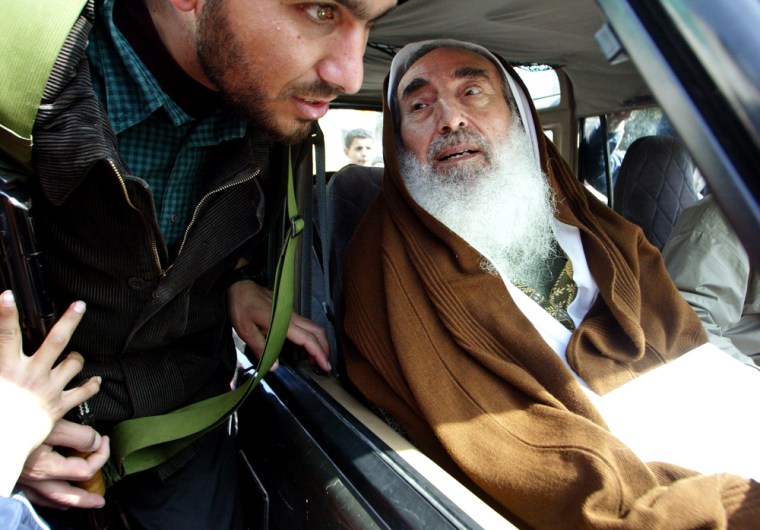Sheik Ahmed Yassin, a quadriplegic preacher, founded the Islamic militant group Hamas in 1987 and presided over its rise to a violent, radical alternative to Yasser Arafat’s Palestinian Authority.
Yassin was killed instantly when an Israeli helicopter launched three missiles at him at daybreak Monday as he left a mosque after morning prayers. He was in his mid-sixties.
Yassin’s Hamas was responsible for scores of suicide bombings and other deadly attacks on Israelis. Since the latest wave of violence began in September 2000, 474 people — the majority of them Israelis — have been killed in 112 Palestinian suicide bombings, most of them carried out by Hamas.
But at the same time, Hamas curried loyalty from impoverished Palestinians by offering desperately needed social services, from kindergartens to health clinics.
Hamas' ideological force
The frail Yassin was the ideological force behind the militant group, which rejects the existence of Israel and opposed interim peace accords. More recently, he said it would be acceptable to establish a Palestinian state in the West Bank and Gaza to be used as a temporary base to destroy Israel.
“Islam is the only answer,” Yassin told The Associated Press in 1997. “Everything springs from that.”
Hamas’ goal of establishing an Islamic state in Israel, Gaza and the West Bank put it not only at odds with Israel but also made it a a threat to the Palestinian Authority, which takes a secular approach to governing and recognizes Israel.
In response to his unyielding rejectionist attitude and the almost unrelenting Hamas attacks, Israel marked Yassin for death.
In September 2003, it dropped a 550-pound bomb on a building where he was meeting with top Hamas leaders. Everyone escaped relatively unscathed; Yassin received a slight wound on his hand.
A childhood sporting accident left Yassin almost completely paralyzed and in recent years he went nearly blind, with poor hearing. But for all his physical frailty, he had compelling charisma.
Yassin, whose age was disputed, was born in what is now the Israeli city of Ashkelon, and his family, like those of hundreds of thousands of Palestinians, was uprooted in 1948 with the founding of Israel. He grew up in Palestinian refugee camps in the Gaza Strip.
Teacher and spiritual leader
He made a name for himself as a teacher and spiritual leader. He did not so much speak as declaim, in language peppered with Quranic allusions. He could move his fingers just enough for limited but highly expressive hand gestures, and would underscore declarations by rearing back his head and rolling his brown eyes.
When he appeared in public, devotees would stand over his wheelchair, tenderly adjusting his white headscarf.
Although Yassin handled millions of dollars in donations from supporters, he was revered for never taking money for himself and his family — his wife, Halima, and their 11 children.
That almost monastic existence stood in sharp contrast to the extravagant, corruption-tainted lifestyles adopted by some Palestinian Authority officials after Gaza came under self-rule in 1994.
The first Palestinian uprising, which erupted in December 1987, put Yassin on the political map.
Within weeks, he founded Hamas as an offshoot of the radical Egypt-based Muslim Brotherhood. Hamas — which means “zeal” and is also the Arab acronym for Islamic Resistance Movement — gained a reputation for ruthlessness, especially against fellow Palestinians suspected of collaborating with Israel.
Despite that, Hamas was not formally outlawed by Israeli military authorities until 1989, fueling the commonly held belief that Israeli and U.S. intelligence fostered the group as a useful counterweight to Arafat’s PLO. With the banning of Hamas, Yassin and nearly 200 other group members were jailed in a mass raid.
Convicted and jailed
He was convicted by an Israeli military court of organizing attacks on civilians and ordering the kidnappings of two Israeli soldiers — one of whom was killed — and was sentenced to life in prison.
In jail, Yassin suffered from a variety of ailments, including chronic bronchitis and eye and ear maladies.
Israeli officials worried Yassin might die in captivity, which could set off Palestinian riots. But fate — in the form of one of Israel’s worst espionage blunders — intervened to free him in 1997.
To ransom its agents captured after a botched assassination attempt in Jordan, Israel was forced to release dozens of Palestinian prisoners, including Yassin.
More than 10,000 cheering followers packed a rundown Gaza City soccer stadium to welcome him back.
Even before Yassin’s release, Hamas dealings with the Palestinian Authority were strained. In 1996, Arafat jailed hundreds of Hamas activists, subjecting them to the ultimate indignity of shaving off their beards, worn as a sign of devout adherence to Islam.
In February of 1998, Yassin left Gaza, ostensibly to obtain medical treatment. Instead, he embarked on a 3½-month tour of Arab countries, reportedly raising more than $50 million and building up political support for Hamas.
Yassin made his second homecoming to Gaza in June 1998, just as Hamas was spurning an offer from Arafat to join the Palestinian government.
The sheik’s precise birth date, like much else about him, was shrouded in mystery.
His son, Abed, and Hamas spokesman Mahmoud Zahar said in June 1998 that he was 62, but were not able to say on what day he was born. His Palestinian passport, however, listed his date of birth as Jan. 1, 1929.
But Abed Yassin said the passport was based on a birth certificate that was probably inaccurate to begin with and was later lost. Yassin himself claimed he was born in 1938.
